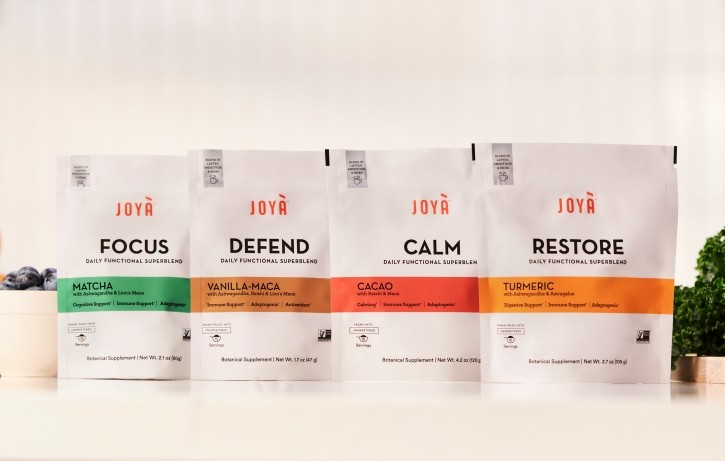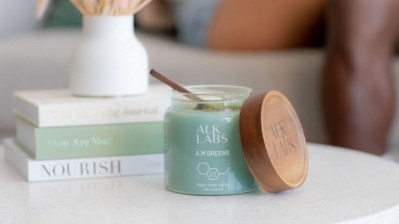Startup Spotlight
Q&A: JOYÀ founder talks fresh take on ‘bitter tinctures and powders and hard-to-swallow pills’

Founded by Ruth Elnekave, a former corporate lawyer and classically trained chef, JOYÀ launched in late 2019. After a strong first 18 months boosted by pandemic-fueled demand for immune and stress support, the company pulled back in 2021 to address kinks tied to supply chain delays, rising costs of inputs, social media strategy and branding.
NutraIngredients-USA caught up with Elnekave who – fresh off a major rebrand – talked about her culinary approach to functional health, how JOYÀ selects and sources its ingredients, and the importance of daily wellness as a cherished ritual that brings people joy.
What motivated you to launch JOYÀ? What opportunities did you see in the market?
Ruth Elnekave: Prior to founding JOYÀ, I was a corporate finance and mergers and acquisitions lawyer at a large national firm. The job took a serious toll on my body. Overworked and overstressed, I found myself suffering from debilitating health issues.
As I transitioned away from law, I began to study holistic nutrition. Luckily, while earning my certification as a holistic health practitioner, I discovered powerful medicinal botanicals that played a key role in my healing journey. The problem was that all the truly efficacious botanical products on the market tasted bitter and medicinal, or necessitated popping handfuls of hard-to-swallow pills daily. I founded JOYÀ to reimagine functional wellness into an easy, effective and delicious daily ritual - one that consumers actually look forward to.
What was your path to market? What went into building and funding the brand?
We launched JOYÀ as a direct-to-consumer brand. Despite being a Canadian brand, we initially launched only US sales, as we had to wait to obtain licenses from Health Canada to market our products in Canada (in Canada, “natural health products” - the equivalent of “dietary supplements” in the US - can only be sold once reviewed and approved by the regulator). Starting our business online not only allowed us to easily launch while waiting for our Canadian approvals, but it was also a very fast and effective way to identify where our core customer markets are located. The online model is also extremely well suited for our Superblends. As a daily use supplement, being able to offer subscriptions allows our customers to easily integrate the products into their daily routines without ever having to worry about running out.
To date, I’ve been able to fund the business through a combination of bootstrapping and investment from a small number of individuals. My goal is to delay formally raising funds and bringing on equity inventors for as long as we’re able to support our growth strategy – which includes our launch into the US retail market in 2023 – with our cash flow from sales, grants and potentially a small amount of debt on favorable terms.
In one interview you mentioned "changing a stale and broken industry"? What are some of the issues? What changes would you like to see?
As I alluded to earlier, the supplement industry is one of bitter tinctures and powders and hard-to-swallow pills. Not only are these products a chore to consume, but they’re also often counterintuitively made with countless sweeteners, fillers and even synthetic ingredients.
I founded JOYÀ on two core beliefs: that better health begins with better ingredients, and that wellness is a lifelong journey that should bring us joy. We’re proud to be leading the charge toward more transparent labels and marketing, 100% pure and clean products that consumers can feel confident about putting in their bodies, and a world in which your daily wellness routine is a cherished ritual.
What sets JOYÀ apart from other similar products on the market?
JOYÀ is bringing much needed innovation to the functional food and supplement space, a category that has been in desperate need of a fresh take. This category is characterized by two main product types: (a) functional foods (rather than supplements) that contain functional ingredients in questionable quantities and quality, processed ingredients and countless types of sweeteners, and that often bear misleading label claims, and (b) supplements that are typically formulated to support one area of health (such as immunity) and come in “medicinal” formats such as tinctures, bitter powders and pills.
Our Superblends and Functional Chocolates are differentiated in a few key respects. Our products are dietary (herbal) supplements expertly formulated with efficacious doses of the highest quality botanicals that are third party lab tested to ensure purity and safety. We use only 100% pure plant-based ingredients - zero fillers, preservatives, flavors, refined sugars or fake sweeteners or junk of any kind. Our products merge the culinary world and the functional health world so that flavor is never sacrificed over function. And finally, we take a unique, proprietary approach to formulation in which every product is built on an adaptogenic foundation to support systemic balance and features additional complementary botanicals that work synergistically to deliver multiple health benefits and support our health holistically.
Where and how does JOYÀ source its ingredients? How do you ensure traceability in your supply chain?
We take pride in sourcing the best ingredients to create the highest quality products. I personally source every one of our ingredients, many of them directly from their growers, and only collaborate with suppliers who meet our high manufacturing and testing standards. I’ve even worked with one of our suppliers to create an extract with custom specifications for JOYÀ. This is a very time-consuming and lengthy process, but I believe that it’s the only way to ensure traceability and be confident about the growing and manufacturing practices used.
Our ingredients, many of which are revered herbs in Ayurveda and Traditional Chinese Medicine, are sourced directly from their native growing regions in countries including India, China, Japan and Peru, rather than mass producing facilities in North America. For example, our certified organic mushroom extracts (fruiting body) are sourced from greenhouse farms in China, where medicinal mushrooms have been grown for millennia, and are grown naturally on substrate materials native to each particular mushroom. Our cacao is directly and ethically traded with farmers who invest back into their surrounding ecosystem and community, and who are paid significantly higher wages than would be paid under “fair trade” programs. At the moment, three of our ingredients are wildcrafted in various remote regions of China (pine pollen, astragalus and he shou wu), and the remainder are certified organic.
Once we receive the ingredients, they undergo rigorous third-party laboratory testing for pesticides, heavy metals, mold, yeast and other microbes to confirm purity and safety.
How are the ingredients selected for the superblend formulas?
I employ a unique approach to formulating our Superblends and Functional Chocolates, anchored in the key concepts of ingredient synergy and holistic health. Ingredient synergy applies to individual herbs as well as herbal formulas. In many cases, whole herbs (and whole herb extracts) are more effective than specific compounds isolated from those herbs, as most plant compounds work better in their natural matrix than in isolation (Mother Nature knew what she was doing!). Similarly, in herbal formulas, the combination of a number of complementary herbs results in formulas that are more effective than the sum of their parts (for example, some herbs increase the bioavailability of others). Further, skillfully combining herbs allows for addressing health holistically, as different herbs support certain bodily functions (e.g., immune function) in different ways.
Once individual ingredient dosages are determined, the challenging yet fun part begins: identifying complementary superfoods and spices to optimize the nutritional and taste profiles of the blend, and testing countless formulas to find the perfect blend that’s as delicious as it is efficacious!
Why did you decide to follow-up superblends with chocolate format?
JOYÀ is a functional wellness brand, rather than a functional blend brand, so our product strategy has always been to create products that deliver real world health benefits in formats that consumers love and are easy to incorporate into their routines. Chocolate felt like the ideal follow-up product line for a number of reasons. We had already developed an incredible line of non-functional, 100% pure, bean-to-bar chocolate that we sold primarily through a few channels in Canada and knew consumers loved, so we had an incredible product “base”.
There is also a massive market for chocolate, and increasingly for better-for-you versions of consumers’ favorite snacks and sweets. Yet not even a handful of brands offer functional chocolate, and most are made with refined sugars, dairy, soy, added flavors, alcohol, gums and even wax. Lastly, with chocolate, we can support our customers’ needs in use occasions that are separate from that of our Superblends. So, using the same approach to formulation and 100% pure ingredients, we’ve created an innovative product that allows consumers to enjoy their favorite indulgent comfort food in a nutrient-packed, low sugar format that delivers functional support when they need it most.
What advice do you have for startups in this space?
The consumer-packaged goods space is competitive and particularly challenging for startups. To succeed and grow, you need to be able to deliver amazing products at great pricing with great margins. Yet to do that, you need to manufacture at scale and be able to take advantage of other efficiencies that only come with growth – a classic chicken and egg situation.
As we saw during the last few years of pandemic-related cost rises and inflationary pressures, it’s virtually impossible to thrive, or even survive, without healthy margins to buffer unexpected challenges. So a few pieces of advice would be to (1) test your product/concept on a small scale and ensure that you have product market fit before investing too much, (2) never take your eyes off your margins (and never think that you can give away margin in the early days because it will come as you grow), and (3) surround yourself with fellow startup founders who are working through similar challenges to you, and experienced operators and other mentors that you can learn best practices from.
















